Chris Baty's Blog, page 77
July 11, 2019
“Character arcs and plot should be closely intertwined—each...

“Character arcs and plot should be closely intertwined—each should affect the other. Does your plot push your character to develop and change? And does your character’s growth allow them to then make decisions that shape the plot?”
—Kat Zhang is an author of books for teens and children. Her Young Adult trilogy, The Hybrid Chronicles, is published with HarperCollins, and she has two Middle Grades, The Emperor’s Riddle and The Memory of Forgotten Things, as well as two picture books, Amy Wu and the Perfect Bao and sequel Amy Wu and the Patchwork Dragon with Simon & Schuster. She wrote her first novel for NaNoWriMo a great many years ago! Follow @katzhang on Twitter.
Your Camp Care Package is brought to you by Camp NaNoWriMo. Sign up to receive more Camp Care Packages at campnanowrimo.org.
July 10, 2019
NaNoWriMo Loves Libraries!
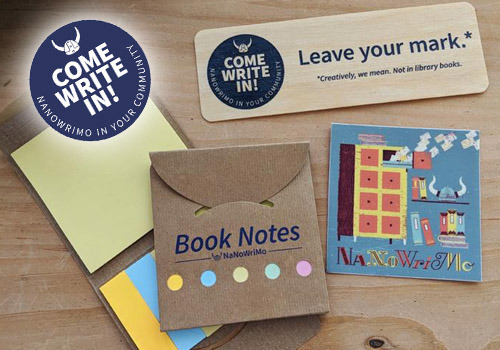
The Come Write In program brings NaNoWriMo to your neighborhood through local library partnerships. Donate to Come Write In by July 15 and receive a collection of library-friendly writer’s gifts. You can also help support by taking a #ComeWriteIn selfie at your favorite library spot, or tagging your local library!
Here are two things we know for sure:
Drafting a novel is way more fun when you’ve got a community writing alongside you.It’s tough to find a low-cost meeting spot that’s got enough space, power, and Wi-Fi for a group of rowdy writers.Here’s a third thing we know for sure… which also conveniently solves the challenges above:
Libraries are among humanity’s greatest achievements.From today through July 15, we’re celebrating these amazing spaces—and inviting you to support our Come Write In library partnership program.
Libraries and NaNoWriMo have been obvious besties since the very beginning.Libraries are already the natural home of so many writers, are set up with programming space to host them, and are (tirelessly!) doing everything they can to support the book lovers who come through their doors.
That’s why, in 2009, we made our relationship with libraries official and created the Come Write In program. This mutually beneficial initiative gives libraries access to our resources, local communities, and passionate volunteers. And it gives those writing communities what they most need: a space to call home.
In the 10 years since it began, our Come Write In program has expanded to include community spaces of all kinds, but libraries have always been at its core. Without libraries and librarians, NaNoWriMo could never have become what it is today.
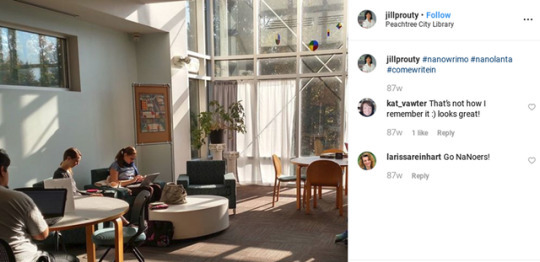
As bang for your buck goes, it’s hard to beat CWI. We offer a kit full of goodies to help entice and encourage writers; provide guidelines and resources on event hosting; and keep in touch throughout the year with tips and support. In return we have an incredible network of spaces for writers—over 1,000 each year—with no strings attached and no cost to our participants.
But we’d love to be able to do more for our Come Write In spaces, and for them to be able to do more for our writers. Your donation will allow us to:
Increase our reach to 1,300 CWI locations.Create this year’s facilitation kits, available to all spaces.Build a CWI accessibility database, so all writers can find a safe, comfortable place to work during NaNoWriMo.Help us reach our $20,000 goal to expand the Come Write In program so we can help give even more people access to everything libraries and NaNoWriMo are able to do together!
Sarah Mackey
Director of Community Engagement
July 9, 2019
"Even the most Fly-by-the-seat-of-your-pants writer can ease the way while drafting by doing what I..."
-

Kat Zhang is an author of books for teens and children. Her Young Adult trilogy, The Hybrid Chronicles, is published with HarperCollins, and she has two Middle Grades, The Emperor’s Riddle and The Memory of Forgotten Things, as well as two picture books, Amy Wu and the Perfect Bao and sequel Amy Wu and the Patchwork Dragon with Simon & Schuster. She wrote her first novel for NaNoWriMo a great many years ago! Follow @katzhang on Twitter.
Your Camp Care Package is brought to you by Camp NaNoWriMo. Sign up to receive more Camp Care Packages at campnanowrimo.org.
July 8, 2019
What Should My Camp NaNoWriMo Goal Be?
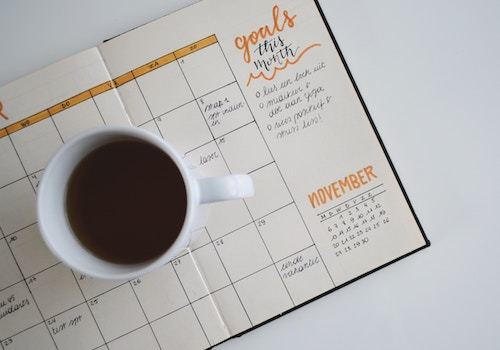
Camp NaNoWriMo is underway! If you’re wondering whether you set the right goal—or if you haven’t started started writing yet—Communications Manager Katharine Gripp has put together a helpful guide for setting your Camp goal:
The great thing about Camp NaNoWriMo is that it’s so flexible. Want to work on a graphic novel, an academic thesis, or a screenplay? No problem! Want to track pages or hours instead of words? Go for it!
But the flexibility of Camp can feel a little intimidating, too. When nobody’s telling you what goal to set this month, how do you know what a reasonable goal to aim for will be? If you’re working on an out-of-the-box writing project, how do you measure your progress?
Here are a few tips we’ve put together to help you determine the best Camp NaNoWriMo goal for you this month. Remember, these are just suggested guidelines: if you set a goal that starts to make you feel frustrated and discouraged, or bored and unchallenged, you can change it!
First, determine what kind of goal you want to work with.Words
Tracking words for NaNoWriMo is… well, traditional! You may want to stick with that framework, or you may find that tracking words doesn’t work with your current project, or feels stifling. Track words as your writing goal if:
You’re working on a traditional novel project and have a good sense of how many words you typically write in a day.You’re working toward a specific word count goal already (say, continuing a novel that you started in November).
Pages
Sometimes, words are just too small a unit to measure your creative progress, especially when you’re working on something a little out of the ordinary. Track pages as your writing goal if:
You’re hand-writing and don’t want to count or calculate all of the words that you write in a day.You’re editing, creating a graphic novel, or working on something that already has a set amount of pages that you’re trying to get through.
Hours/Minutes
Sometimes, you have goals that can’t be measured in how much you physically write. Track hours as your writing goal if:
You know how much time you’ll be able to set aside for writing this month, but you don’t know or aren’t consistent in how much you typically write in a session.You’re editing, drawing, researching, or working on some other project that doesn’t actually involve writing down a specific amount of words.Ok, I’ve decided what kind of goal to track. Now what should I aim for?
Take it Easy
If you know you’re going to be super busy this month and won’t have a lot of time to devote to writing, or if you’re starting your project a few days late, start small.
Words: Try setting a goal for 10,000 words. That’s a little over 300 words a day. If you find yourself meeting this easily, you can up it to 15,000 words; if you’re falling behind or you’ve missed a few days, ease it down to 5,000. Sometimes, just starting is more important than going big.Pages: The lower limit of every goal you can set is 30, so try setting your goal to 30 pages. Depending on what you’re working on, a page a day can still feel like a big challenge, but go for it!
Hours/Minutes: We don’t all have the luxury of setting aside an hour a day to write. Sometimes, snatching minutes here and there is all we have! Try setting a goal of 900 minutes — that’s about 30 minutes a day.
Leveling Up
If you’ve never done NaNoWriMo before, or if you know that getting to 50K exhausts you, try setting a goal that feels challenging, but fun.
Words: Start out aiming for 20,000 or 30,000 — that’s between about 600 and 1000 words per day. It’s a healthy chunk of writing that nonetheless shouldn’t be too hard to reach.Pages: Double it up! Set a goal of 60 pages to get through two per day.
Hours/Minutes: Set a goal of 30 hours, or about an hour a day. If you don’t have hour-long blocks to set aside, you can also set your goal to 1,800 minutes, to make it easier to record when you write for smaller amounts of time.
Overachiever
If you’ve done NaNoWriMo, and you’ve found that 50K is a reasonable (or even easy!) goal for you to achieve, try going the extra mile.
Words: Set your goal for 60K, 75K, or 100K, depending on how fast your fingers fly!Pages: Aim to finish at least half of the full amount of pages you have in your project. If you’re editing a 50,000-word novel that you wrote in November, for example, you probably have about 200 pages, so make your goal 100 pages.
Hours/Minutes: Set a goal of 60 hours, or about 2 hours a day. Committing to a goal measured in hours may encourage you to set aside longer blocks of time to write.
Of course, you can always change your goals it you fall behind or jump ahead with your writing. Remember that Camp NaNoWriMo is here to help you reach your writing goals, but it’s also supposed to be fun!

Katharine loves being the Communications Manager for NaNoWriMo, where she gets to indulge in her life-long addiction to Young Adult fantasy novels. When not writing, Katharine spends her time dancing, working on cosplays that she never finishes, playing folk-punk music with her band, and spending as much time in the sunshine as she can.
Top photo by Estée Janssens on Unsplash.
July 5, 2019
Camp Pep: The Key to Your Creative Heart

Camp NaNo is underway! You have a story to tell, a job to do. This story has been growing inside you, itching to make its way into your manuscript. But the words seem to be getting stuck in your throat. Why?! Today, Camp NaNoWriMo participant AJ Dodge offers some advice on staying true to your heart and keeping your story alive:
As writers, we get caught up in the minutiae of writing in an intimate way, and this can cause us to forget that we love what we’re doing.
Some complain about spending hours on a sentence. Others gripe about the difficulty of getting started. And still others discourage themselves by editing while they write, judging every letter they type or scrawl.
There are few who would refute that getting started is the hardest part—I, however, am one of those few.
There are a couple of keys to ‘getting started’ that have benefited me over the last few years of my writing life, and the first is to banish expectation. This requires some confidence in the self, and mustering that confidence is one of the most important aspects of getting started.
Don’t be afraid to believe in yourself and love what you create.Although it is true that your beginning must be catchy and snappy, poignant and hooking, your first sentences have nothing to serve without the body of the novel, poem, or short story. I have found that by banishing the expectation of The Most Awesome First Sentence Ever, I was able to plow through and finish the body of the novel, which then allowed for a more meaningful beginning.
When your plot is fully developed, your characters are whole, and you know what direction your story goes in, you will find that writing that first sentence or paragraph becomes a playground. You have all the colors of your new piece of writing to help you churn out a succulent hook or endearing first sentence.
My best advice about getting started is to write the stories that live in your heart, rather than pressuring yourself to write what you think you’re supposed to write.
If you’re passionate and excited about what you’re going to write, getting started is that much easier.Write the story you’ve never been able to tell until now. Write something autodidactic. Write about that completely strange character you can’t stop thinking about. Write the stories you tell yourself to get through the day.
Confidence and love are two incredibly important ingredients in being a creative person. Without confidence in yourself, getting started is the hardest part because you’ve already decided that what you’re going to write is not good. Without love for the story you’re about to tell, getting started is the hardest part because there is no fervor.
To be consistently creative in a way that satisfies ourselves, we must take care of and love ourselves. This idea gets lost in the myriad of tips and hacks we read online every day.
Creative self-love begins with dashing high expectations and diving into the story that lives in your heart.
AJ Dodge is a speculative fiction writer living on the east coast of Maine, US. She has been published in the Devilfish Review and Outrageous Fortune, and is working to do the same with the novels and short stories she had been hammering away on for the last several years. Cats, music, and tea are the essential ingredients to her creativity, along with a healthy dose of love. Follow her on Instagram or Twitter.
Photo by Bart LaRue on Unsplash
July 4, 2019
"Did you ever read a book and just feel so glad it exists?
Or maybe it was a single scene or one..."
Or maybe it was a single scene or one minor character who wandered in and out just long enough to connect with you.
At some point in your life, a story helped you feel Not Alone.
Because it rang true.
And something you write could do that for someone else out there. People respond to and connect with stories that feel vulnerable and honest. Whether they are scifi or mystery or romance or any genre.
So, go write your truth. Someone’s waiting for it.”
-
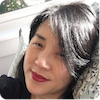
Kat Yeh is the award-winning author of middle grade novels, The Way to Bea and The Truth About Twinkie Pie (an NPR Best Book of 2015 written during NaNoWriMo!) from Little, Brown Books for Young Readers, and picture book, The Friend Ship, from Disney-Hyperion—as well as others. Kat currently lives with her family in Philadelphia, PA. Learn more at katyeh.com, or follow @yehface on Twitter.
P.S. You pronounce her last name YAY!
Your Camp Care Package is brought to you by Camp NaNoWriMo. Sign up to receive more Camp Care Packages at campnanowrimo.org.
July 3, 2019
Overcoming Blocks on the Road to Camp NaNoWriMo!
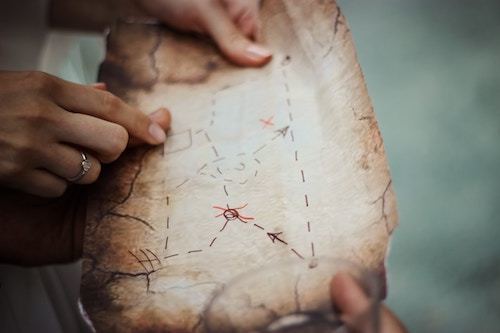
Camp NaNoWriMo is here! It’s an exciting time, but it can feel a bit intimidating to tackle a new project head-on. Today, Camp NaNoWriMo Participant Elizabeth Sacks offers some helpful hints on how to keep writing when you feel stuck:
It’s Camp NaNoWriMo time!
One of the few times of the year millions of old pros and novices come together to write a fantastical new story. If you are new to this exciting experience, I bet you’re worried about tackling that first writer’s block that comes your way. Maybe you’re experiencing one right now. It happens to beginners and seasoned writers alike. I’m here to give you some tips and tricks on how to overcome that dreaded block on the road to an awesome story.
The first thing you can do is go to NaNoWriMo’s “Word Sprint” tab. This page has an awesome “Dare Me” button that will give you random writing prompts. Use that prompt to write a wild event into your draft. You may like the way this scene works into your story, or you may not.
The point is to keep writing! You can always edit it out in the revision.The next thing you can do is write a different part of the story. There’s no rule that says you have to write from beginning to end. Jump around as much as you need. Start at the end. Jump to the middle. Go backward. Go forward again. Sometimes, when you know where the characters end up, you’ll know how they got there.
If neither of those solutions work, then take a break. Eating a meal or spending time with friends and family will refresh your mind. Watch a TV show or movie, then write about your antagonist watching that movie and crying over the love scene. That’s the best part about NaNoWriMo, you can go as wacky as possible, and no one has to know about it later.
It’s a time of experimentation, your only limit is how far you’re willing to go with the unusual.Lastly, if you filled out a character questionnaire (if you didn’t, go do it now), then refer back to it. This questionnaire is not just for you to get to know your characters, you can also use it to make your own writing prompt. This handy tool asks questions about the protagonist and their hobbies, the way they speak, pet peeves, insecurities, fondest memories, and so on. You could write about their fondest memory, and how it helps, or causes more problems, for all characters involved. This questionnaire is not just for the protagonist, but the antagonist and supporting characters as well. You could write side-plots for the supporting characters from the questionnaire. The possibilities are endless.
The ultimate challenge at Camp NaNoWriMo (and NaNoWriMo in general) is to reach your goal. The one thing you cannot do, if and when you hit writer’s block, is stop writing. Fight back with writing prompts, jumping from one end of the story to the other, taking a break, and asking questions. Something amazing may come out of it, but you’ll never know until you let loose and experiment.
Elizabeth has participated in NaNoWriMo three times, and now Camp NaNoWriMo twice. She writes religious children’s novels and published her first book in February 2019. She is currently attending college, but manages to find time to hang with family and friends, write books, read books, and watch plenty of TV shows and Movies. You can follow her on her website, blog, and Facebook page.
July 2, 2019
“Some people say write what you know—I say write what you feel....
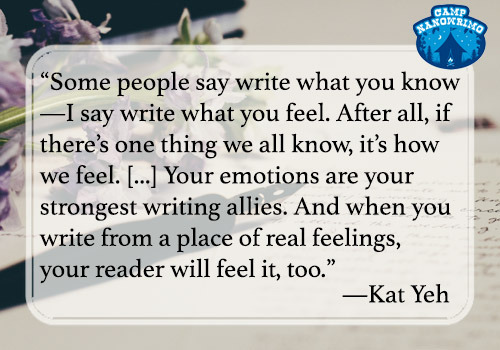
“Some people say write what you know—I say write what you feel. After all, if there’s one thing we all know, it’s how we feel. […] Your emotions are your strongest writing allies. And when you write from a place of real feelings, your reader will feel it, too.”
—Kat Yeh is the award-winning author of middle grade novels, The Way to Bea and The Truth About Twinkie Pie (an NPR Best Book of 2015 written during NaNoWriMo!) from Little, Brown Books for Young Readers, and picture book, The Friend Ship, from Disney-Hyperion—as well as others. Kat currently lives with her family in Philadelphia, PA. Learn more at katyeh.com or follow @yehface on Twitter.
P.S. You pronounce her last name YAY!
Your Camp Care Package is brought to you by Camp NaNoWriMo. Sign up to receive more Camp Care Packages at campnanowrimo.org.
Text added over original image by Debby Hudson on Unsplash.
July 1, 2019
Camp NaNoWriMo Has Begun!

Happy July! We’re so excited to be writing with you at Camp NaNoWriMo this month… and especially intrigued to see what you’ll do with that extra 31st day. Have you started your project already?
Here’s our pro tip for getting started: Give yourself a hundred words, maybe two, to write without any creative pressure or expectation. Consider it a way of breaking in that blank page, and limbering up your creative expression.
If you want, you can even take on a prompt from the @NaNoWordSprints crew on Twitter, check in with our Camp Counselors during their tweet chat next Monday, or join a Virtual Write-In for some real-time writing camaraderie!
And when you start writing, don’t forget to update your progress so you can track it throughout the month (and get those sweet, sweet writing badges on your Camp NaNoWriMo profile).
Start your writing project with Camp NaNoWriMo today!June 28, 2019
Read the Young Writers Program Flash Fiction Contest Honorable Mentions!
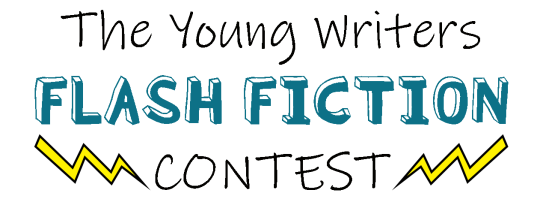
Last month, we challenged our young writers (18 and under) to submit a 300-word story involving a balloon. From over 1,100 fabulous entries, we chose two Grand Prize Winners and eight Honorable Mentions. We hope you enjoy reading them as much as we did!
“Golden Dawn” by Yuchi Z. — “Venus’s scarred, tortured surface passed beneath Manuel’s gaze as the balloon gained altitude. The domed city of Jardines Ishtar, gleaming bright in the fiery sun, became faint on the horizon…” Read the rest!
“Center of the Universe” by Maneesh J. — “The astronauts looked out from the window of their spaceship at the bloodred world below them. All but one. While the others stared at Mars, their future home, one astronaut was gazing further…” Read the rest! 11-13 Division Honorable Mentions:“A Balloon of Nightmares” by Ally N. — “The balloon is the color of midnight. This fits because this balloon in particular is not a happy balloon. It is rumored to hold all the evils and sorrows of this world…” Read the rest!
“The Balloon Festival” by Logan M. — “I release the balloon into the air, and see hundreds of others doing the same. I watch my balloon float up, a blue dot against the sea of red. People gasp and point at the abnormal balloon color…” Read the rest! 10 and Under Division Honorable Mentions:“Silver Lily” by Iris D. — “IN THE SMALL MARKETPLACE of Shellkey, there was a silver balloon tied to a stake. No one knew how the balloon had never deflated, but it didn’t matter. The oddest thing about the balloon was that it had a girl in it…” Read the rest!
“Travel” by Gabrielle G. — “An old, gray dog was striding along a dusty road in the middle of a field. He was wondering about whether or not the old lady who lived down the road would give him some of her food…” Read the rest!
“The Time Balloon” by Leia F. — “The balloon was pink and shiny, like a wad of bubblegum. Mikayla loved blowing it up just a little, so her mom, a dentist, would freak out, thinking Mikayla was chewing gum…” Read the rest!
Chris Baty's Blog
- Chris Baty's profile
- 62 followers



